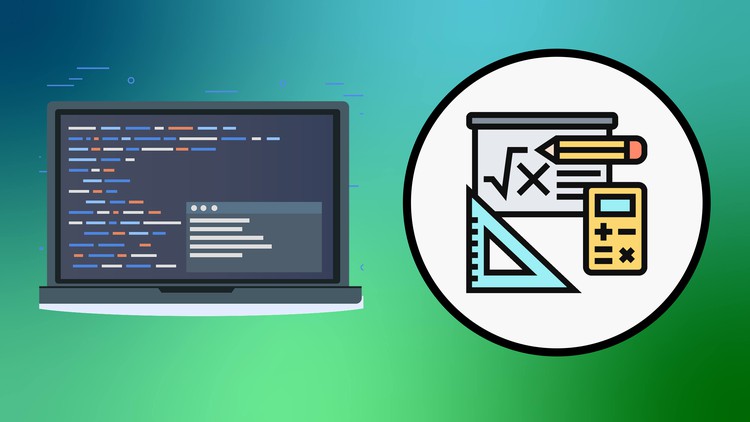
From Basics to Advanced Operations
⏱️ Length: 7.1 total hours
⭐ 4.46/5 rating
👥 8,482 students
🔄 October 2023 update
Add-On Information:
“`html
Note➛ Make sure your 𝐔𝐝𝐞𝐦𝐲 cart has only this course you're going to enroll it now, Remove all other courses from the 𝐔𝐝𝐞𝐦𝐲 cart before Enrolling!
-
- Course Title: Advanced Math for Computer Science Mastery
- Course Caption: From Basics to Advanced Operations
- Length: 7.1 total hours
- Rating: 4.46/5 (8,482 students)
- Last Updated: October 2023
-
Course Overview
- Bridge foundational mathematical principles with critical computer science applications for deeper understanding.
- Explore the theoretical bedrock of modern computing, from data logic to efficient algorithm design and system security.
- Cultivate a rigorous analytical mindset, moving towards constructing provably correct and optimized solutions.
- Gain an intellectual toolkit to understand computational methods’ genesis, limitations, and innovation potential.
- Unravel the intricate interplay between abstract mathematical constructs and concrete computational realities.
- Master the mathematical language essential for comprehending academic research and advancing technical careers.
- Uncover theoretical underpinnings dictating computational system performance, reliability, and security.
- Elevate understanding from executing algorithms to mathematically certain design and validation.
- Emphasize critical thinking and formal reasoning for engineering solutions and theoretical insights.
- Dive into core intellectual disciplines enabling intelligent systems, secure protocols, and efficient data processing.
-
Requirements / Prerequisites
- Foundational discrete mathematics (sets, relations, combinatorics) is highly recommended.
- Familiarity with a programming language and core constructs is beneficial.
- Genuine curiosity for abstract problem-solving and formal reasoning is essential.
- Prior exposure to proof-based reasoning or basic logic concepts will significantly aid comprehension.
- Strong commitment to challenging exercises and conceptual assimilation is expected for mastery.
- Basic algebraic proficiency and ability to follow structured arguments are solid base requirements.
- An open mind towards diverse problem-solving paradigms for deep conceptual comprehension.
-
Skills Covered / Tools Used
- Develop advanced formal reasoning for computational correctness and efficiency arguments.
- Master abstracting complex computational problems into mathematical formulations.
- Acquire proficiency in analyzing algorithm and process complexity, predicting performance.
- Gain expertise in applying structured problem decomposition, breaking intractable problems into solvable components.
- Utilize specialized formal specification languages to define system behaviors for high-assurance software.
- Employ symbolic manipulation techniques and computational frameworks for exploring mathematical structures.
- Leverage mathematical software environments for theoretical concept experimentation and system dynamics simulation.
- Critically evaluate and adapt mathematical models to novel computer science problems, fostering innovation.
- Design robust, fault-tolerant systems by applying principles from deep mathematical insights.
- Grasp principles for designing self-correcting or verifiable computational processes for higher reliability.
-
Benefits / Outcomes
- Elevate problem-solving prowess, resolving intricate challenges in AI, cybersecurity, and beyond.
- Design and implement efficient, provably correct algorithms and data structures.
- Understand computation’s theoretical limits, identifying intractable problems and devising innovative solutions.
- Lay a formidable foundation for advanced academic pursuits in computer science or related fields.
- Boost career prospects for challenging analytical and design roles.
- Develop discernment to critically evaluate and contribute to research papers.
- Gain analytical toolkit to excel in formal methods, cryptography, machine learning theory, and advanced algorithm design.
- Foster an architectural mindset for software and system design, informed by underlying mathematical models.
- Become an innovator, conceiving new computational models based on mathematical principles and practical impact.
- Enhance ability to articulate complex technical concepts with precision and clarity for leadership.
-
PROS
- Provides a uniquely deep dive into mathematical foundations for computer science mastery.
- Structured to build advanced analytical and problem-solving skills, highly valued in complex roles.
- Offers pathway to understanding theoretical underpinnings of advanced AI, secure systems, and efficient algorithms.
- The updated content ensures relevance with current computer science challenges and paradigms.
- Positive student ratings and high enrollment indicate a well-regarded and effective learning experience.
- Flexible, self-paced learning format with clearly defined modules, accessible to busy professionals.
-
CONS
- The abstract and rigorous nature of the content demands significant dedication, consistent effort, and a substantial time commitment.
“`
Learning Tracks: English,IT & Software,Other IT & Software
Found It Free? Share It Fast!